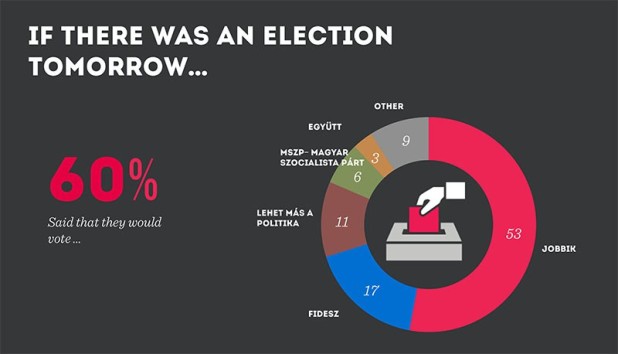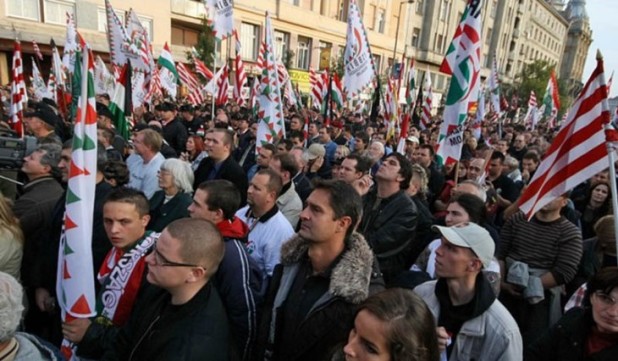The New Observer
April 13, 2016
Around 53 percent of all millennials—those aged between fifteen and thirty-four years old—support the Jobbik party in Hungary, up from just 9 percent in 2012, a new study has shown.
The report, produced by the far left “Foundation for European Progressive Studies” (FEPS) Millennial Dialogue institute, was based on an online survey of one thousand Hungarian millennials.
Source: Millennial Dialogue report.
The report, which can be downloaded in full here, says that the sample was “recruited to be nationally representative of all Hungarian Millennials in terms of age, geographical region, household income, and educational attainment levels.”
The study found that on average, 66 percent of Millennials were interested in politics to varying degrees, with 6 percent being “very interested” and only 34 percent saying that they were “not at all interested.”
When asked who they would vote for “if there was an election tomorrow,” 53 percent said they would vote for Jobbik, 17 percent for the ruling Fidesz party, and only 6 percent for the “reformed” communist party, now masquerading as a the “Hungarian Socialist Party” or MSZP.
When asked to rank individual politician’s popularity, 26 percent opted for Jobbik leader Gábor Vona, and only 13 percent for the Fidesz leader—and current Prime Minister—Viktor Orbán.
Further good news for Jobbik came in the rest of the survey:
When asked which party scores the highest for understanding young people, Jobbik led all other parties in the following categories:
Being believable in what they say, having the right ideas to improve life in Hungary, having intelligence, being honest, good in a crisis, in the ability to listen to others, the ability to be firm, strong against corruption, ethics, an understanding of young people, a caring nature, and its ability to keep up with the latest technologies.
The only categories where Jobbik lost to Fidesz were in the ability to come across well on TV (Fidesz polled 45 percent to Jobbik’s 44 percent) and in “non-political experience.”
The latter category refers to the fact that Jobbik has never actually been in government.
According to a 2013 report by FEPS, titled “Young and Easily Allured? A Comparative Analysis on the Relationship between Populism and Youth in Europe,” one of the reasons for Jobbik’s appeal is the relative youth of the entire party.
According to that report, Jobbik is not just the youngest parliamentary party with the lowest average age among its MPs, “but it also has a very strong and popular youth organization.”
“If we take the Facebook websites of youth sections of every Hungarian parliamentary party and the number of followers of these sites as an indicator of the popularity, we register a dramatic difference: while Jobbik IT [youth] had 21,000 followers in December 2013, the governing party Fidesz’s youth section, Fidelitas, had 5,000, and the Hungarian Socialist Party’s youth section Societas had only 1,800.
“In other words: the radical populist Jobbik’s youth organization seems to be ten times (!) more popular than its socialist counterpart and four times more popular than the current governing party’s.”
That same report revealed that at the 2010 election, only 9 percent of millennials voted Jobbik.
 Daily Stormer The Most Censored Publication in History
Daily Stormer The Most Censored Publication in History




